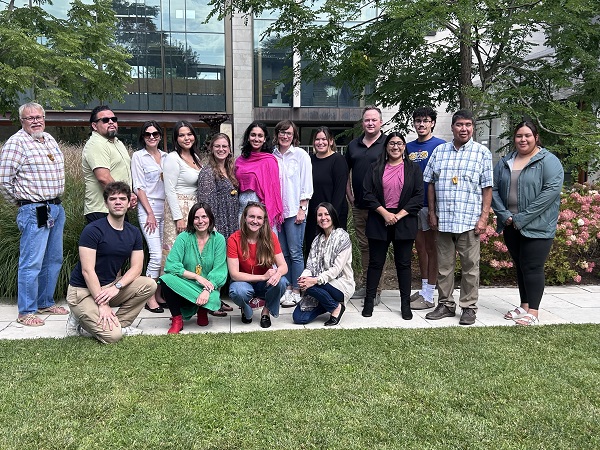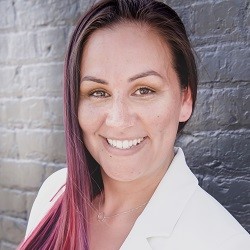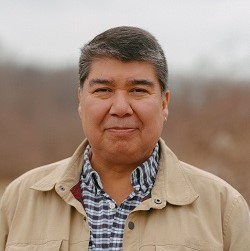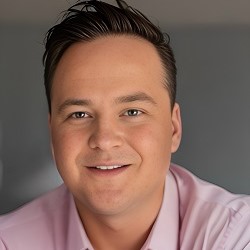When it comes to advancing reconciliation, it’s a mutually beneficial journey – one where Indigenous and non-Indigenous Peoples listen, learn, and reflect together on how to create a better future.
A recent five-day workshop at Ivey, Reconciling Business Schools: Co-creating an Indigenous Ivey Workshop for Indigenous and Allied Learners, brought together Indigenous scholars and community leaders, Ivey scholars, and a small group of students to do just that (see list of Indigenous scholars and community leaders below). Together they shared Indigenous and Western worldviews, engaged in Indigenous-led ceremonies, and discussed ways to create practice-oriented pathways to the Truth and Reconciliation Commission’s Calls to Action. The workshop, funded by the Social Sciences and Humanities Research Council, the John F. Wood Centre Curriculum Development Fund, and the Ivey Centre for Building Sustainable Value, also included sessions on land-based learning, Indigenous entrepreneurship, Indigenous-led finance, and governance.
The initiative was co-organized by the Indigenous scholars and community leaders and Ivey professors Diane-Laure Arjaliès, Oana Branzei, and Zoe Kinias along with Erin Huner, PhD ’21 (Western), Director of Culture and Inclusion at Ivey; Maggie Weller, Senior Associate with the Wood Centre; and Melanie Issett, HBA ’20, a Sustainable Finance Research Fellow. Arjaliès said the idea for the workshop came after learning from Western University’s Office of Indigenous Initiatives that Indigenous students coming to Western don’t typically apply for Ivey’s awards for Indigenous learners. The goal of the workshop was to discuss ways to decolonize Ivey’s curriculum and create a safe and welcoming space for Indigenous and allied learners.
“This workshop is the beginning of a journey where we work with Indigenous teachers from the communities in the region and we co-teach together and envision what can be done,” said Arjaliès. “It’s a mutually beneficial journey because our students benefit from this knowledge as well.”
Noting how the initiative strengthened connections between the Indigenous and non-Indigenous participants, Branzei said she’s excited about the opportunities to keep the momentum going.
“We grew in connection. We took the time to sit in circle, learn on the land, listen with our bodies, engage with our full beings, and shore up one another’s dreams, opening additional possibilities for future collaboration,” she said. “Looking forward together, we can begin to Two-Eyed see (bringing together Indigenous and Western worldviews) new bridges across programs within Ivey, among disciplines and faculties at Western, and between national platforms that embolden Indigenous knowledge-keepers, leaders, and entrepreneurs to make the future relational and respectful.”

The full group of workshop organizers, facilitators, and participants.
Reflections on the Reconciling Business Schools workshop
The workshop participants, facilitators, and Indigenous scholars said they were inspired and transformed by the initiative. Below three attendees – Terri Fisher, Clint Jacobs (facilitator), and Peter Markvoort, HBA ’08 – share personal reflections in their own words.
Terri Fisher (participant)
AEMCA, RMT, Indigenous Studies student, Western University
Anishinaabe kwe ndaaw (I am), Deshkan Ziibing ndoonjibaa (I am from)
As I maneuver through my undergrad, I am at this crossroad as to where to best be of service to my people and my community. I was intrigued to see this program/co-creation initiative from Ivey. For me, it provided this opportunity to be within Ivey and understand how the delivery of the program differs from other business schools. Also, I wanted to exercise my voice in the co-creation process for something as important as bringing together Indigenous Peoples within an institutional setting that is built on systems that do not meet the needs of the original people of the land their school is built on.
I am based in community and connections and the women of Ivey facilitating this course were on the same page, which made it very welcoming and easy to share. I was able to appreciate each speaker and reflect on the information shared in a way that strengthened my own world views and has provided me with additional tools.
Sandra Schillo from Niwee was one of those guest speakers. I was able to apply and be accepted into Niwee's Grandmother Moon Fellowship, which is an entrepreneurship program for Indigenous women. I started in the beginning of September, and I get to create support and be supported with 20-plus women across Canada while we endeavour into the world of entrepreneurship.

Clint Jacobs (facilitator)
Adjunct Indigenous Scholar, University of Windsor
Anishinaabe from Bkejwanong, Walpole Island First Nation
I am grateful for the invitation and collaboration with Erin Huner and Diane-Laure Arjaliès. I met and reconnected with so many wonderful faculty, staff, teachers, and participants. I am thankful that we were able to have a space outside and start our day together in a circle. Connecting to nature and one another helped to open ourselves up to the sharing and learning that followed. Each of the sessions throughout the week helped to illuminate efforts to make change and ways for individuals to be part of that change. I was moved by the health and well-being session with Bill Hill, Ro’nikonkatste. His stories and lessons on personal healing had an impact. I trust everyone is continuing to release stones/hurts that we no longer need to carry. Every day left an imprint. I look forward to reconnecting with everyone.

Peter Markvoort, HBA ’08 (participant)
Registered Social Worker, Psychotherapist
Mi'kmaq, La Nation Micmac de Gespeg
Participating in the Reconciling Business Schools initiative was a transformative experience that brought my education full circle, and perhaps ignited a new chapter in my academic journey. I graduated with an HBA in 2008, and a Master of Public Administration in 2010. Almost 15 years later, I came back to Western and completed a Master of Social Work with my research focused primarily on the Indigenization of health-care pedagogy. As an Indigenous (Mi’kmaq) person, I never imagined that I could bring my traditional and academic knowledge back to my alma mater to spark change in the dialogue of a discipline that is so deeply rooted in euro-centric epistemology.
The work being done at Ivey is groundbreaking. The concept of a financial model that incorporates value through Two-Eyed Seeing (Etuaptmumk) and measures returns not just through a capitalist lens, excites me. The concept of viewing Indigenous entrepreneurship through a community/collective lens, excites me. The business school is starting to have the real conversations, and is doing the real work toward reconciliation and Indigenization.
The experience brought together two important aspects of my life that I never imagined could co-exist; my Indigeneity and my business education. Through thoughtful dialogue with people from diverse backgrounds, we laid the groundwork for more conversations and more change to come. There are not words that can explain how deeply personal and emotional it was to share a smudge with like-minded people in the courtyard at Ivey. There is hope that my two worlds can transform from dichotomy to harmony, and I am so grateful to have been – even if in just a small way – a part of this transformation.
Indigenous scholars and community leaders involved in the workshop:
- Candace Brunette-Debassige, Assistant Professor, Western University, Mushkego Cree iskwew from Peetabeck;
- Clint Jacobs, Adjunct Indigenous Scholar, University of Windsor, Anishinaabe from Bkejwanong, Walpole Island First Nation;
- Kim Wheatley, Public Speaker, Event Organizer, Writer, Ceremonial Practitioner, Anishinaabe Ojibway Grandmother from Shawanaga First Nation;
- Samantha Whiteye, Indigenous Leadership Director, Carolinian Canada, Community Leader from Eelūnapéewi Lahkéewiit; and,
- Ro’nikonkatste (Standing Strong Spirit) Bill Hill, Co-CEO of Noojimo Health, Mohawk from Six Nations.



